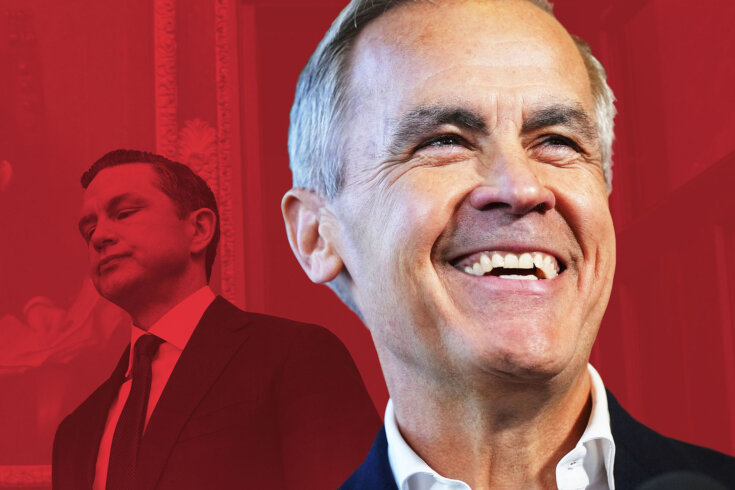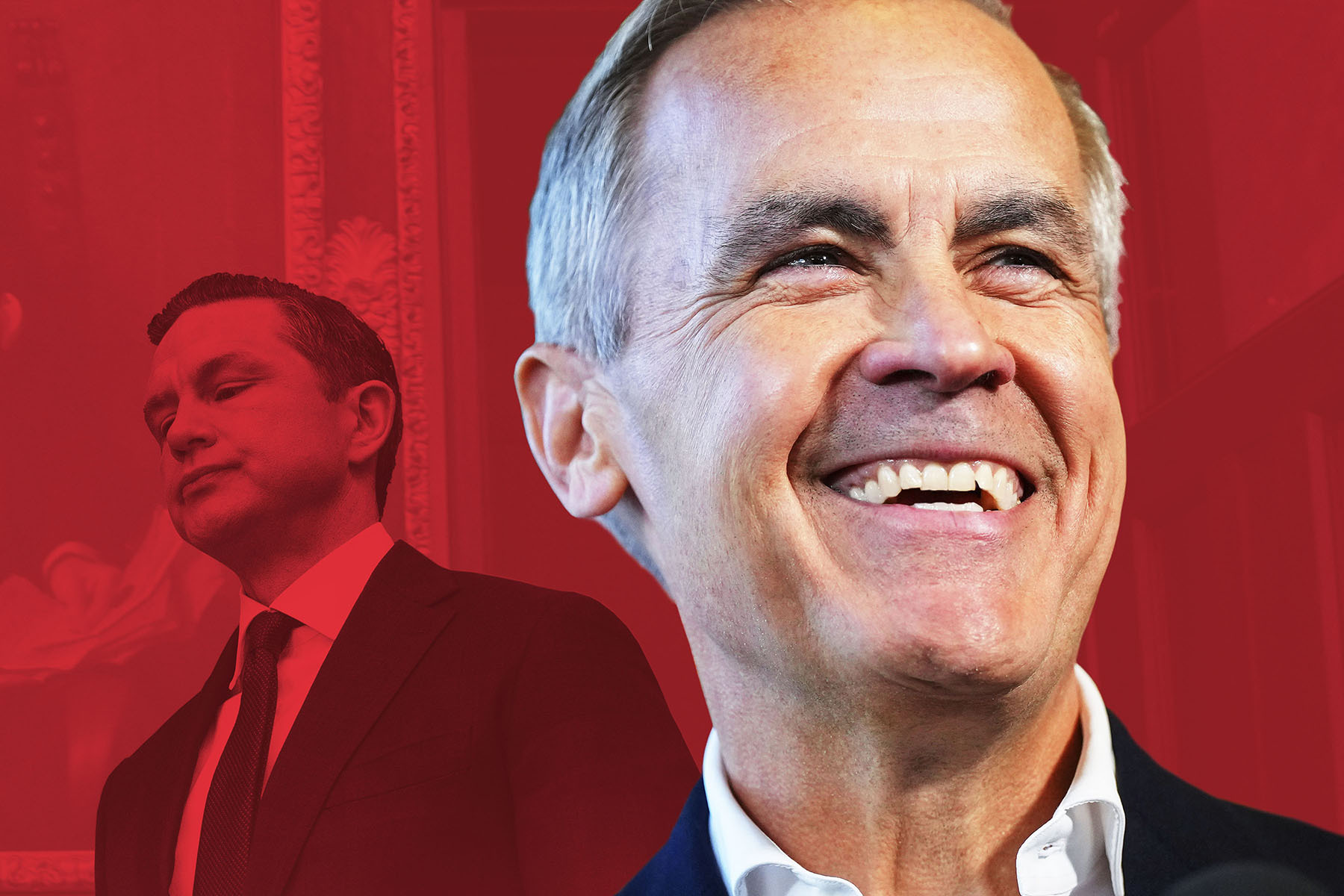Polls suggest Mark Carney is reshaping the electoral landscape

thewalrus.ca
Pierre Poilievre’s Lead Was Supposed to Be Unshakable. It Isn’t
Polls suggest Mark Carney is reshaping the electoral landscape
by
Philippe J. Fournier Updated 8:22, Feb. 12, 2025 | Published 6:30, Feb. 12, 2025

Adrian Wyld/Darryl Dyck/CP / Brian Morgan
“Events, dear boy,” then UK prime minister Harold Macmillan once said when asked what the greatest challenge for a statesman was. Never underestimate how events can shape—and reshape—public opinion quickly.
The past month of federal polling in Canada indicates that multiple events have caught the eyes and ears of voters. After more than a year of relatively stable numbers from coast to coast, all pointing toward a sweeping victory for Pierre Poilievre’s Conservatives in the next federal election, everything seems to have turned on a dime.
Of course, not all events are created equal. First, we saw Justin Trudeau announce his resignation in early January, after eighteen months of increasingly poor polling numbers. Second, the Liberal leadership race got underway, drawing varying levels of interest across the country. But third—and most significantly: repeated threats of tariffs, annexation, and the use of “economic force” against Canada from the Bully-in-Chief south of the border may have shaken many to their core.
It appears that several Canadian voters are reconsidering their options, with only months to go before they are called to elect a new Parliament.
Last week, the latest Quebec-only Leger
poll measured a significant uptick in support for the Liberals at the expense of the Bloc Québécois. With the soon-departing Trudeau still named as Liberal leader, 29 percent of Quebec respondents said they would support the Liberals if an election had been held last week. Compared to another Leger
poll fielded in mid-January, Liberal support jumped eight points—well outside the poll’s estimated margin of error. The Bloc fell eight points, from 37 percent to 29 percent, while the Conservatives held third place with a respectable 24 percent in the province.
An anti-Trump sentiment bump from Quebec voters? Modest but notable approval of the federal government’s handling of Trump’s threats? Both are fair hypotheses to explain such a sharp shift in public sentiment.
However, this wasn’t even the most shocking part of Leger’s newest data.
Insert Mark Carney into the equation and the numbers take an unexpected turn. To the question “If Mark Carney were to become leader of the Liberal Party of Canada, which party would you support?”, 38 percent of Quebec respondents sided with the Liberals, compared to 24 percent for the Bloc and 22 percent for the Conservatives. You read that correctly: in this hypothetical scenario—which seems increasingly plausible as the Liberal leadership race progresses—a Carney-led Liberal Party
would hold a fourteen-point lead over the Bloc.
An anglophone banker with acceptable-but-not-remarkable French giving the Liberals a boost in Quebec? Surely, this surge comes from support concentrated in Montreal’s stretch from Westmount to Beaconsfield, right?
Surprisingly, no. Leger’s numbers show that among Quebec’s francophone majority, inserting the former Bank of Canada governor as Liberal leader shifts the party from an eleven-point deficit to a three-point lead over the Bloc (see chart below).
Obviously, caution is warranted with polling numbers based on hypotheticals. Many Quebec voters may not be familiar with Carney, but Leger’s data suggests that the idea of him as Liberal leader
at least intrigues many of them.
These Quebec numbers sparked questions about whether—and by how much—the political landscape is shifting. If there really is a rally-around-the-flag effect happening
in francophone Quebec, of all places, surely this movement could be detected elsewhere in English Canada.
A new Nanos Research
poll for CTV and the
Globe and Mail asked Canadian voters who they felt would do the best job negotiating with US president Donald Trump. Nationally, 40 percent of respondents chose Carney, compared to 26 percent who were in favour of Poilievre, with another 13 percent selecting former finance minister and Liberal leadership candidate Chrystia Freeland.
The regional breakdown shows Carney leading by double digits in Atlantic Canada, Quebec, Ontario, and British Columbia. Only in the Prairies (Manitoba, Saskatchewan, and Alberta) did Poilievre hold an advantage over Carney.
Another piece of the puzzle: last Friday, Pallas Data released its latest national
poll—the first fully fielded and published since Trump paused his tariff threats for thirty days—and the numbers point to a dramatic Liberal comeback. Pallas’s generic
ballot (that is, with Trudeau as Liberal leader) showed the Conservative lead shrinking from seventeen points in January to just six points.
When Pallas tested a Carney-led Liberal Party against its rivals, the result was a statistical tie: Liberals at 39 percent, Conservatives at 38 percent, with the New Democratic Party taking the hardest hit, dropping to just 9 percent national support. In Quebec, the Pallas data all but confirmed Leger’s findings about Carney boosting Liberal fortunes.
Data points are adding up.
While the polls differ on the magnitude of this sudden shift in public opinion, they all agree on the direction of the trend. The events of recent months, to varying degrees, have reshaped the political landscape. We may have a real race, after all, once the writ drops later this year.
Some observers have been quick to point to past examples of new leaders and prime ministers enjoying short-lived honeymoons before crashing in a general election: John Turner in 1984, Kim Campbell in 1993. While these are valid precedents, nothing is set in stone. Both Campbell and Turner ran terribly poor campaigns that turned their respective honeymoons into political disasters, ultimately resulting in crushing defeats. We shall soon see whether history will repeat itself in 2025. Assuredly, more events are to come.

 may be time to change the thread title @FAH1223
may be time to change the thread title @FAH1223


